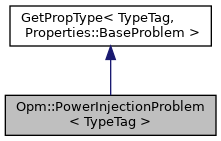1D Problem with very fast injection of gas on the left. More...
#include <powerinjectionproblem.hh>

Public Member Functions | |
| PowerInjectionProblem (Simulator &simulator) | |
| void | finishInit () |
| Called by the Opm::Simulator in order to initialize the problem. More... | |
Auxiliary methods | |
| std::string | name () const |
| The problem name. More... | |
| void | endTimeStep () |
| Called by the simulator after each time integration. More... | |
Soil parameters | |
| template<class Context > | |
| const DimMatrix & | intrinsicPermeability (const Context &, unsigned, unsigned) const |
| template<class Context > | |
| Scalar | ergunCoefficient (const Context &, unsigned, unsigned) const |
| Returns the Ergun coefficient. More... | |
| template<class Context > | |
| Scalar | porosity (const Context &, unsigned, unsigned) const |
| template<class Context > | |
| const MaterialLawParams & | materialLawParams (const Context &, unsigned, unsigned) const |
| template<class Context > | |
| Scalar | temperature (const Context &, unsigned, unsigned) const |
Boundary conditions | |
| template<class Context > | |
| void | boundary (BoundaryRateVector &values, const Context &context, unsigned spaceIdx, unsigned timeIdx) const |
| Evaluate the boundary conditions for a boundary segment. More... | |
Volumetric terms | |
| template<class Context > | |
| void | initial (PrimaryVariables &values, const Context &, unsigned, unsigned) const |
| Evaluate the initial value for a control volume. More... | |
| template<class Context > | |
| void | source (RateVector &rate, const Context &, unsigned, unsigned) const |
| Evaluate the source term for all phases within a given sub-control-volume. More... | |
Static Public Member Functions | |
| static void | registerParameters () |
Detailed Description
class Opm::PowerInjectionProblem< TypeTag >
1D Problem with very fast injection of gas on the left.
The velocity model is chosen in the .cc file in this problem. The spatial parameters are inspired by the ones given by
V. Jambhekar: "Forchheimer Porous-media Flow models -- Numerical Investigation and Comparison with Experimental Data", Master's Thesis at Institute for Modelling Hydraulic and Environmental Systems, University of Stuttgart, 2011
Constructor & Destructor Documentation
◆ PowerInjectionProblem()
|
inlineexplicit |
Member Function Documentation
◆ boundary()
|
inline |
Evaluate the boundary conditions for a boundary segment.
- Parameters
-
values Stores the fluxes over the boundary segment. context The object representing the execution context from which this method is called. spaceIdx The local index of the spatial entity which represents the boundary segment. timeIdx The index used for the time discretization
This problem sets a very high injection rate of nitrogen on the left and a free-flow boundary on the right.
◆ endTimeStep()
|
inline |
Called by the simulator after each time integration.
This method is intended to do some post processing of the solution. (e.g., some additional output)
◆ ergunCoefficient()
|
inline |
Returns the Ergun coefficient.
The Ergun coefficient is a measure how much the velocity is reduced by turbolence. It is a quantity that does not depend on the fluid phase but only on the porous medium in question. A value of 0 means that the velocity is not influenced by turbolence.
◆ finishInit()
|
inline |
Called by the Opm::Simulator in order to initialize the problem.
If you overload this method don't forget to call ParentType::finishInit()
◆ initial()
|
inline |
Evaluate the initial value for a control volume.
- Parameters
-
values Stores the primary variables. context The object representing the execution context from which this method is called. spaceIdx The local index of the spatial entity which represents the boundary segment. timeIdx The index used for the time discretization
◆ intrinsicPermeability()
|
inline |
◆ materialLawParams()
|
inline |
◆ name()
|
inline |
The problem name.
This is used as a prefix for files generated by the simulation. It is highly recommend to overwrite this method in the concrete problem which is simulated.
◆ porosity()
|
inline |
◆ registerParameters()
|
inlinestatic |
◆ source()
|
inline |
Evaluate the source term for all phases within a given sub-control-volume.
- Parameters
-
rate Stores the values of the volumetric creation/anihilition rates of the conserved quantities. context The object representing the execution context from which this method is called. spaceIdx The local index of the spatial entity which represents the boundary segment. timeIdx The index used for the time discretization
For this problem, the source term of all components is 0 everywhere.
◆ temperature()
|
inline |
The documentation for this class was generated from the following file: